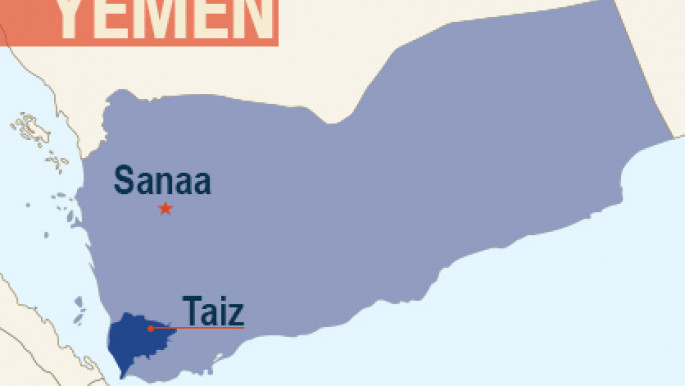Yemen: Hadi-allied forces continue advance on Taiz
Hadi-aligned forces backed by a Saudi-led coalition have continued to advance on the city of Taiz, where locals have been fighting the Houthi rebels for months - despite dire humanitarian conditions inside the city.
"The advance of pro-government forces has been slow but steady, especially in the south and west of Taiz city," a source in the Popular Resistance Committees told Fares al-Jalal, al-Araby al-Jadeed's Yemen correspondent.
 |
|
"Both sides have suffered huge losses. The rebels are using snipers, trenches and landmines as well as human shields to hamper the advance of pro-government forces, in particular in al-Rahida, south of Taiz city," the source added.
Al-Rahida, Taiz province's second-largest city, has long been the site of clashes between Houthi rebels and pro-government forces; this week rebels blew up several bridges to further hamper advances.
Hadi has recently announced that new recruitment centres would be set up in Aden, Yemen's second largest city and the refuge of pro-Hadi forces, for young men to receive military training so they can officially join the army and receive salaries, according to al-Araby al-Jadeed's Arabic service.
In Taiz, residents are battling back against a months-long siege by the Houthi rebels, with hundreds killed and food, water and medicines running short in a potentially pivotal battle in the country's protracted civil war.
The Houthis have surrounded the city of Taiz for months, shelling neighbourhoods and battling with local fighters. The anti-Houthi forces are trying to advance from further south, fighting their way towards the city to break the siege.
If the Houthis lose at Taiz, which lies on the border between northern and southern Yemen, it could be a major turning point in the war. It would cement the Houthis' loss of the south, reducing their areas of control to the capital, Sanaa, and their strongholds in the far north, along with some areas in the centre with little strategic significance. That could force them into negotiations with the internationally recognised government, led by Hadi.
Residents in the city of some 250,000 say more than 1,600 civilians have been killed in the siege since March, largely by Houthi shelling. Electricity has been mostly cut, water supplies are low and food and other supplies have to be smuggled in.
 |
|
| The Houthis have shelled the city for months [Getty] |
On Tuesday, the UN accused the Houthi rebels of blocking deliveries of aid to Taiz.
"Houthi and popular committees are blocking supply routes and continue to obstruct the delivery of urgently needed humanitarian aid and supplies into Taiz city," said Stephen O'Brien, the under-secretary-general for humanitarian affairs.
An education official in the rebel-controlled province of al-Mahwit has complained that the Houthis are recruiting children inside local schools by enforcing a curriculum and activities that support the rebel group, according to al-Araby al-Jadeed's Arabic service
"Our children are being dragged into politics. Authorities must keep education far from political and sectarian fighting and focus on living together in harmony," said Mohammad al-Anesi, the director-general of education in al-Mahwit.
The Houthis, based in the north of the country, took over the capital in September last year, eventually driving Hadi south. The rebels then advanced over large swathes of the country, backed by army units loyal to Saleh, Hadi's predecessor.
At their biggest advance, they nearly overwhelmed Aden, at the far southern tip of the country. In March, Houthis seized government buildings inside Taiz and encircled the city.
But in recent months they have been pushed back on several fronts under the air campaign led by Saudi Arabia, backing a mix of anti-Houthi forces, including tribal fighters, southern separatists, Islamic militants, other militias and army units loyal to Hadi. They secured Aden in July and retook control of several southern provinces.
Progress to reach Taiz, 100 kilometres northwest of Aden, has been slow as troops attempt to cross minefields laid by the Houthis, who have also been sending reinforcements from the north.
Fighting has intensified as the two warring sides hold preliminary consultations in Oman this week to prepare for peace negotiations.
This week, Yemen's Vice-President Khaled Bahah said the government was ready to talk with the Houthi rebels.
"The Yemeni political leadership represented by Yemeni President Hadi and members of the government are ready to participate in the UN-sponsored talks with the [Houthi] militia and deposed [president] Saleh to stop the war operations in Yemen as soon as possible," he said.





 Follow the Middle East's top stories in English at The New Arab on Google News
Follow the Middle East's top stories in English at The New Arab on Google News

![Israeli forces ordered bombed Gaza's Jabalia, ordering residents to leave [Getty]](/sites/default/files/styles/image_330x185/public/2176418030.jpeg?h=a5f2f23a&itok=_YGZaP1z)
